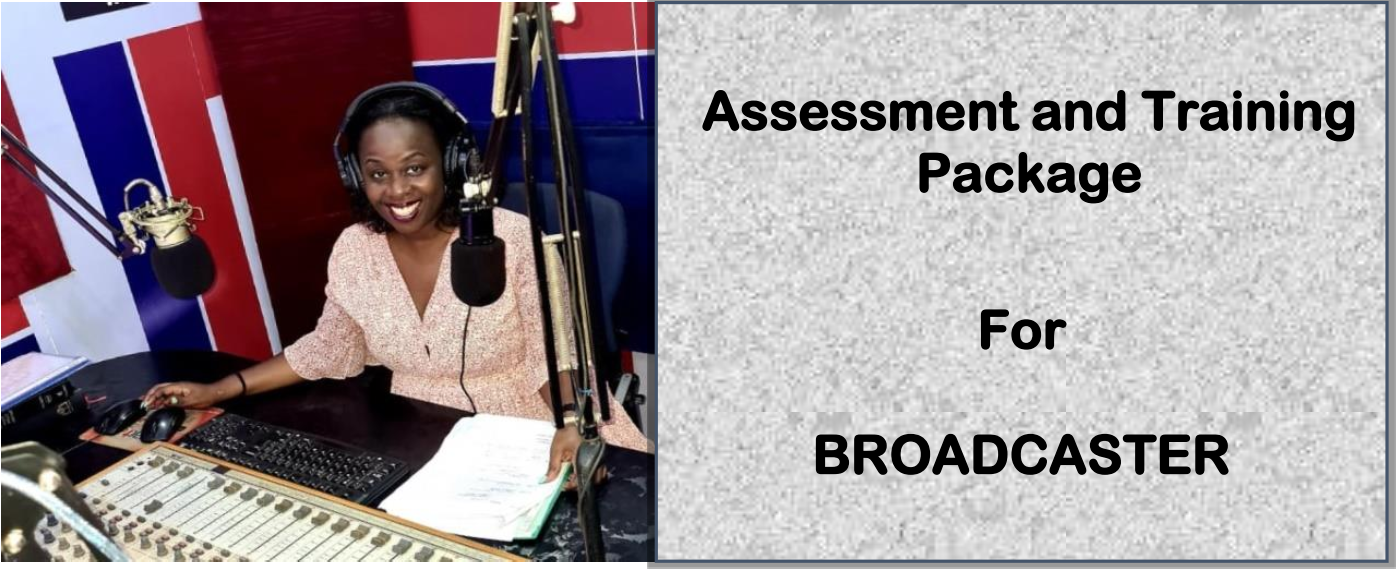

he “Occupational Profile” (OP) of a BROADCASTER. This Occupational
Profile which was developed by BROADCASTERs practicing in the world of work,
mirrors the duties and tasks BROADCASTERs are expected to perform in the world
of work.
0.2 PART II: “Training Modules” in the form of guidelines to train BROADCASTERs
both on the job as well as in training centres (or combinations of both venues of
learning). The Training Modules herein have been developed basing on the
Occupational Profile and hence are directly relevant for employment.
0.3 PART III: “Assessment Instruments” in the form of performance (Practical) and
written (theory) test items that can and should be used to assess whether a person
complies with the requirements of employment as a BROADCASTER. These
assessment instruments were developed jointly by job practitioners
(BROADCASTER) and teachers based on the occupational profile and training
modules
.
1
0.4 While the Occupational Profile (OP) contained in PART I of this document provides
the information on WHAT a person is expected to do competently in the world of
work, the test items, -including performance criteria- of PART III qualify the HOW
and/or HOW WELL a person must do the job.
In combination, both parts -the OP and the test items- constitute the relevant
‘Assessment STANDARDS’ for competence-based assessment and certification for
acquiring a credible Qualification for – Broadcaster-Qualification Level 1.
0.5 The modular format of the curriculum (PART II) allows learners to acquire job specific
skills and knowledge (i.e. competencies) module by module. A single module can be
accomplished within a relatively short duration of time allowing flexibility for learners
to move directly into an entry level job, go for further modules or advance to higher
levels of training. Modular courses allow more learners to access the training system
because training centers as well as companies can accommodate more students in
a given period of time.
0.6 In addition to improved access, equity and relevance of BTVET, the UVQF will also
enable people who are convinced to have acquired competencies laid down in this
ATP through prior training and on-the-job experience to access assessment and
certification directly; be it on the basis of a single module, a group of modules or all
1
In this document, only sample test items for assessing (practical) performance and occupational knowledge (theory)
are included. A larger selection of test items can be obtained from an electronic Test Item Bank at Directorate of
Industrial Training
v
0.1. The parts of this Assessment and Training Package were sequentially developed
as follows:
i Part 1: Occupational Profile: January 2022
ii Part 2: Training Modules: January 2022
iii Part 3: Assessment Instruments: January 2022
This ATP (or parts of it) may be periodically revised to match the dynamic trends in the
occupation and hence issued in different versions.
Are you in need of a new gambling game to pass the time? Do you…
ENFUMO ZA BUNYORO KITARA."""""""""""""""""""""""""""""""""""""""""""""""""""""" Ababiri bamira ebigambo, abasatu babisaturura Abagenda babiri baijukyangana Abaingi banobwa atubire…
You can download WAKISSHA JOINT MOCK EXAMINATION UACE 2024 AGRICULTURE PAPER 5152 marking guide Download…
You can access the Wakissha 2024 senior four mock exams question papers for different subjects…
The Uganda national Examinations Board (UNEB) has released the 2024 Primary Leaving Examinations, Uganda Certificate…
Download the exam Below 208_1_NLSC_Sample_24Download Download the Scoring / Marking Guide Here 208_1_NLSC_Sample_24_GuideDownload CLICK HERE…
Leave a Comment